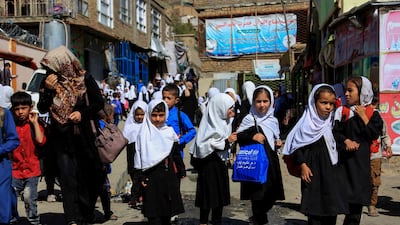The UN said on Tuesday that it was ready to take the “heartbreaking” decision to leave Afghanistan after the ruling Taliban imposed strict conditions on how the organisation operates.
This month, the organisation banned female employees of UN agencies from working in the country, rebutting criticism of the move by describing it as an “internal issue.”
The UN said in response that it was considering whether to continue operating in Afghanistan.
Amina Mohammed, the UN deputy secretary general, condemned the move and said that “giving up on women's rights in Afghanistan is simply not an option.”
The regime in Kabul regained power in August 2021 after a western-backed government collapsed, following the abrupt withdrawal of western military forces.

Critics of the Taliban said it has reneged on promises to keep schools open for girls up to the sixth grade, a decision the UN Assistance Mission in Afghanistan called a “cruel blow to the rights of Afghan women”.
UNDP administrator Achim Steiner told The Associated Press that negotiations on the status of women staff were continuing, but talks on the issue have not been successful.
“It is fair to say that where we are right now is the entire United Nations system having to take a step back and re-evaluating its ability to operate there,” Mr Steiner said. “But it’s not about negotiating fundamental principles, human rights.”
The Taliban allowed Afghan women to engage in some work, he said, and a UN report released on Tuesday showed that the country needs more women working, with its economy failing.
The Taliban takeover has been accompanied by some very modest signs of economic recovery. There has been some increase in exports, some exchange rate stability and less inflation.
But gross domestic product, the sum of all goods and services produced within Afghanistan's borders, is expected to be outstripped by population growth, meaning that per capita income will decline from $359 in 2022 to $345 in 2024, the report said.
About $7 billion in funds managed by the former government's central bank have been frozen by the US and EU following the Taliban takeover, but late last year, the US said it had created an Afghan Fund with Swiss banks to distribute half of that sum as aid for Kabul.
No aid has yet been disbursed from the fund, pending assurances from the Taliban that the central bank is independent from the group.
Some of those economic problems the result of Taliban policies that keep most women out of the workplace, Mr Steiner said.
Those economic problems mean more need in the country, but the UN has decided that human rights are non-negotiable and it will leave in May if the Taliban do not relent.
“I think there is no other way of putting it than heartbreaking,” Mr Steiner said. “I mean, if I were to imagine the UN family not being in Afghanistan today, I have before me these images of millions of young girls, young boys, fathers, mothers, who essentially will not have enough to eat.”
A source of faint optimism is the Taliban’s allowing women to work in specific circumstances in health, education and some small businesses.
“In one sense, the de facto authorities have enabled the UN to roll out a significant humanitarian and also emergency development assistance set of activities,” Mr Steiner said. “But they also continuously are shifting the goalposts, issuing new edicts.”
Afghanistan’s deputy economy minister, Abdul Latif Nazari, did not respond to questions from the AP about the country’s economic conditions.
A spokesman for the Finance Ministry, Ahmad Wali Haqmal, was unavailable for comment.

